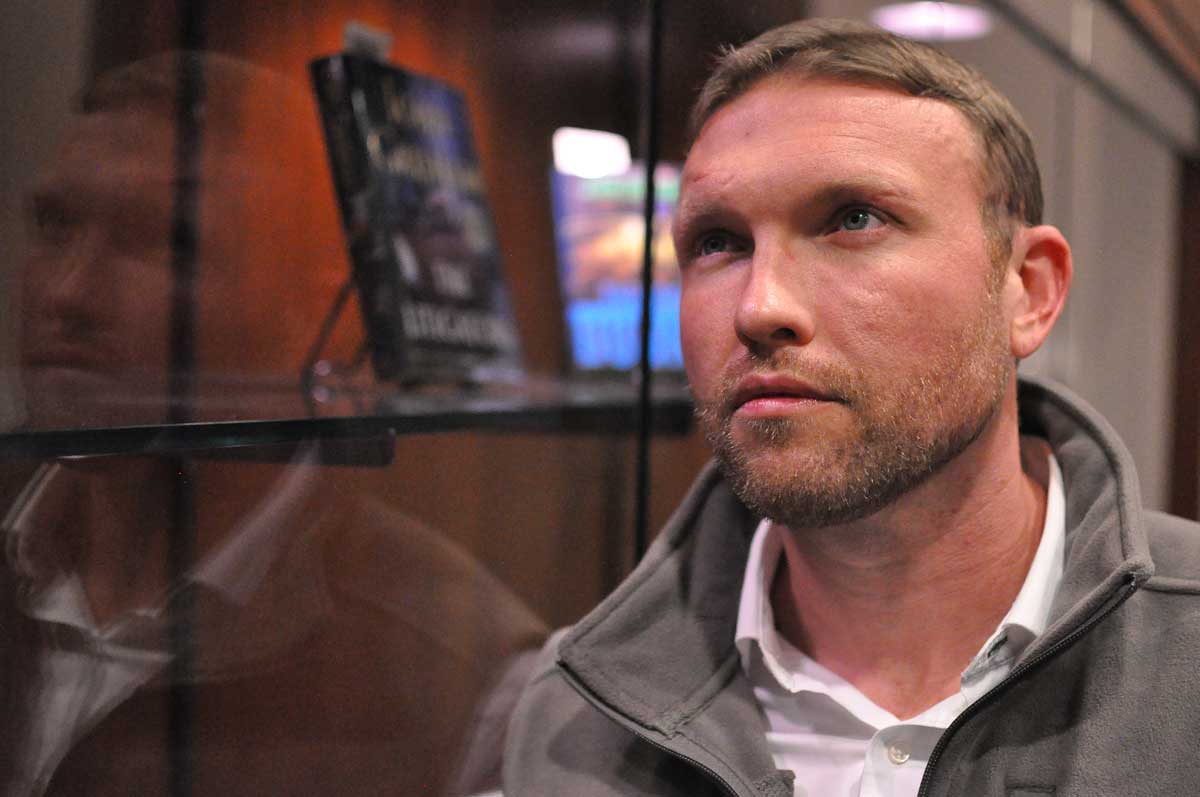When Josh Horton’s phone rang, a voice on the other end told him something he never wanted to hear. The world turned silent. Shock coursed through his body.
His best friend John was dead. Heroin overdose.
“You never think it’s going to happen to people you know,” Horton, then a sociology undergraduate student, said.
His best friend’s 3- and 5-year-old daughters sat on the curb with their suitcases. The last time they saw their dad, his body was hard and flies were buzzing around his mouth.
“He had gotten into prescription pills, the typical story of the opiate epidemic,” Horton said. “He started taking painkillers, could no longer access those painkillers and then found out that you could get heroin for half the price and twice the kick.”
John had begun injecting heroin to get his fix, not knowing that what he was doing would end up killing him.
“Opioid epidemic” is the phrase used to describe the high number of overdose deaths nationwide resulting from the addictive nature of opiate-based drugs designed to alleviate pain.
Opioid painkillers include drugs such as hydrocodone, morphine and codeine, which can all be highly addictive. This addiction can lead patients heroin after using up their prescribed supply
This epidemic claims up to 78 American lives every day, according to the Mississippi Bureau of Narcotics, and has quickly become one of the nation’s most lethal drug epidemics.
Now 34 years old and in his third year at the University of Mississippi School of Law, Horton is studying criminal law, has founded the non-profit organization Southern Recovery Advocacy and has served on the Governor’s Opioid and Heroin Task Force for the state of Mississippi.
The moment his best friend died was the moment Horton decided to use his own experience with addiction to help others. As a 15-year-old, Horton dropped out of high school and spent the next 14 years of his life in and out of jail because of his own addiction.
“I had a lot of fear surrounding coming out and talking about my own personal struggles, because it’s just so stigmatized,” he said.
In order to make a difference, Horton had to overcome his fears.
“I realized I could try and go through this educational system. I could fly under the radar, go get a law degree and do corporate law and try and hide my past, like so many people in recovery do,” Horton said. “But I decided against that.”
His story, along with those of many others who have suffered the same condition, has come to the forefront in the battle against the opioid crisis in Mississippi — which ranks fifth in the country for number of opioid overdose deaths per capita — and across the nation.
The situation
Last month, President Donald Trump declared the opioid epidemic a national public health emergency. Between 1999 to 2015, opioid overdose deaths killed twice the number of people in the United States as World War I, the Korean War and the Vietnam War did combined and is the number one cause of death for people under the age of 50, according to the Centers for Disease Control and Prevention.
“We’re on the brink of a super-pandemic — that’s how we termed it in our opioid threat assessment for the state,” Lt. John Harless of the Mississippi Bureau of Narcotics said at an opioid town hall meeting last month in Oxford.
The opioid crisis has crept its way through Appalachia, barreled across the country and is not shying away from Mississippi.
Mississippi Secretary of State Delbert Hosemann told The Daily Mississippian there are around 201,000 dosage units of opioids in Mississippi right now. He said the heroin cases investigated by the Mississippi Bureau of Narcotics are up 300 percent, and 200 people have died from opioid overdose in the state this calendar year. Hosemann said it’s an epidemic he can’t ignore, and it’s one his office has been actively involved in addressing.
“I’ve seen states like Ohio, Kentucky, Florida and Vermont that have been battling this epidemic, and it’s coming our way,” Mississippi Attorney General Jim Hood told The Daily Mississippian in an interview.
On behalf of the state, Hood filed the nation’s first lawsuit against big pharmaceutical companies for misrepresenting the addictive nature of opiate-based painkillers.
“We’re losing so many people to overdose deaths,” Hood said. “People don’t realize how bad it is.”
Hood was the district attorney in Oxford during the ‘90s, when the crack epidemic and meth epidemic were both prevalent issues, and he said he has yet to see another epidemic that affects such a broad spectrum of people. Hood said the government needs to spend more money and effort on mental health treatment and rehabilitation.
“It haunts me to think of how many kids I was responsible for sending to prison in the ‘90s when I was DA,” Hood said. “They had a mental health issue, were really self-medicating, then wound up getting addicted. That led to them selling those drugs, and that’s how they got into the penitentiary.”
The stigma
Horton wrestled with his own addiction for 14 years because he was afraid of what would happen when he admitted he had struggled with addiction.
“The stigma keeps us quiet,” he said. “Our silence is literally killing us.”
Ann Rodio, program administrator at the Mississippi Department of Mental Health, said silence is a major issue in the battle against opioid addiction.
“We have no idea what amount of resources we need if we don’t know what we’re dealing with in the communities,” Rodio said. “If we don’t know how many people need help, we lose funding dollars that will come back into your communities to help people.”
Horton is still dealing with issues rooted in his past offenses. He struggled to find housing when moving to Oxford because of his convictions, and instead of walking into his internship at the U.S. district court through the back door like his coworkers, he walks in through a metal detector.
“We’re taking a medically diagnosed condition and we’re criminalizing it, and I feel like that’s unconstitutional,” he said.
Once labeled a felon, it’s more difficult to get a job, education, housing, basic life skills and other things that make it easy to reintegrate into society.
“We wonder why there’s a revolving door on the jail and we’re losing 175 people a day to the opioid epidemic,” Horton said. “It’s because we’re not treating it. We’re criminalizing the behavior and not addressing it as a public health issue.”
Criminalization comes at a cost, too. According to Lt. Harless, the fiscal cost of the opioid addiction — treatment, incarceration and health care — is estimated at $78.5 billion nationwide.
“That’s not lost days from work. That’s not the toll on families, not the toll on children,” Harless said.
The “tough on crime” mentality prevalent in the political environment, which has its roots in the late ‘60s and early ‘70s, is the idea that arresting the offenders will get rid of the drug issue. Horton said this mentality needs to be uprooted from society’s way of thinking in favor of actual treatment for the offenders.
“Really tough people help somebody up. They don’t need to go seek to punish,” he said. “The really, really tough people are the ones going out there and saying, ‘How can we help?’”
Horton took this approach when he served on the Governor’s Opioid and Heroin Study Task Force for the state, a group of experts in their respective fields which created a list of 41 recommendations on how to best confront the opioid epidemic in Mississippi for Gov. Phil Bryant. The task force agreed that addressing the issue by funding treatment instead of incarceration would be the most successful long-term approach.
“We’re trying to educate people that you’re not a moral failure,” Horton said. “You’re not a bad person trying to get good. You’re a sick person trying to get well, you’re not a criminal.”
The recovery
Horton said there are two major concerns for him about treatment when dealing with the opioid crisis — the political agenda and big pharmaceutical companies.
According to him, politics combined with pharmaceutical companies’ lust to stay in business takes away from addressing the real problems with lack of access to recovery. To keep profits high, these companies are now recommending medication-assisted treatment, which means giving patients another drug to take the place of the current one. “A substance is not going to fix a substance problem. It is not meant to be a recovery replacement,” he said
For Horton, enrolling in college and meeting other people going through the same struggle helped him during his recovery process.
“It was this perfect storm of circumstances that allowed me to be able to go forward,” he said. “I don’t know which one is more important, the education or the recovery.”
A helpful part of his recovery was being removed from his environment in Atlanta, where he had connections with his past drug offenses. Horton was fortunate to have this opportunity, but not everyone is so lucky.
Horton said it is difficult to find adequate resources to help someone through the recovery process, especially on Ole Miss’ campus. He was a guest speaker in a freshman experience class just last week and said the students were attentive and fascinated by everything he was talking about, because they had little to no knowledge about opioids and addiction.
Colleges such as Texas Tech and the University of Alabama provide sober housing on campus, meetings for those going through recovery and employees on campus who have been through recovery themselves and are ready to help those students. Compared with these other college campuses across the South, Ole Miss offers fewer resources to help students seek treatment or continue the recovery process. Horton wanted to do something to change this, so he created Southern Recovery Advocacy. His non-profit attempts to shift the mentality towards addiction in Oxford and across the South.
“We really want to start targeting it and going after it and start advocating for those who can’t really advocate for themselves,” he said.
Horton said he’s proud of what the Southern Recovery Advocacy has accomplished and that it’s been well-received by communities, but he recognizes it cannot have as much of an effect on campus because it isn’t affiliated with the university.
The university has also started to take action, however. Just this semester, the university announced it would open the William Magee Center for Wellness Education, which will be housed in the new $32 million South Campus Recreation Center, in hopes of educating students about substance abuse issues.
“The Center for Wellness Education will strive to become a nationally recognized leader in education, support and research contributing to the development and implementation of effective, evidence-based strategies for substance abuse prevention in a collegiate environment,” said Erin Cromeans, assistant director of health promotion for the Department of Campus Recreation.
Cromeans said in order to change the culture surrounding addiction, students must decide the status quo is unacceptable and voice their concerns.
“It took 20-plus years to create the current culture of use and may take just as long to shift it back, but it can be done,” she said.
Campus organizations such as Student Wellness offer resources to help students battling addiction, among other mental health conditions. Coordinator of Student Wellness Taja Hereford said her office visits classes throughout the school year to make students aware of the physical and mental effects of addiction.
“We definitely try to be the voice of prevention instead of reaction,” Hereford said. “Making sure we’re being proactive in our approach to things, making sure our messages are consistent across campus.”
The group hosts a Wellness Wednesday each week in front of Weir Hall on campus, meant to put students in a healthier mindset as they go through their day. Hereford said this month’s events are focused on men’s health and today’s Wellness Wednesday is geared towards substance abuse education.
Horton thinks things are becoming better for those affected by the opioid epidemic but there are still challenges to be fought.
“I think we’re on the verge of a major cultural shift in this country,” Horton said. “I think this is going to be one of those moments in history where we look back and we say ‘which side of history were you on?’”














